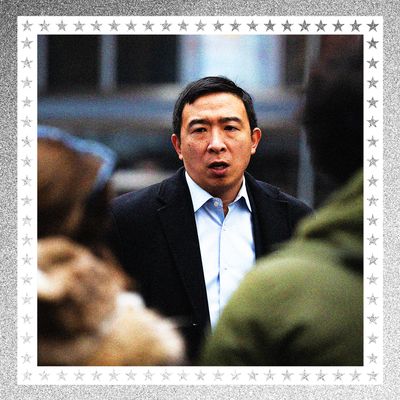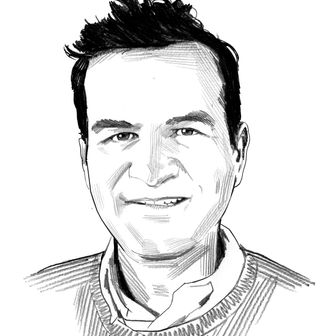
Did Andrew Yang know all the answers to a New York Times test about the city because he is the Math Guy, or does he know all the answers because he looked them up?
Some of Yang’s rivals, all trailing the front-runner in the polls and running low on time to mount a comeback, are suggesting to Intelligencer that it is the latter after the Times released the transcripts from its editorial-board endorsement interviews. During the newspaper’s “pop quiz” section, Yang — a candidate who has been questioned over his New York ties and his knowledge of the city — got the answers to all three fact-based questions exactly right. He was alone among the eight candidates to do so, though some of his rivals got two right and were close on the third. The suggestions that Yang must have had help come as the candidates prepare to gather for the first debate, to be broadcast this evening on NY1 and WNYC.
The pop-quiz portion consisted of three questions: the median price of a Brooklyn home; the median residential rent in Manhattan; and the percentage of New York City public-school students who are homeless. After the transcripts were released, most of the attention was focused on how three of the candidates — former Citigroup executive Ray McGuire, civil-rights attorney Maya Wiley, and former Obama administration official Shaun Donovan — were off on the first question by nearly $1 million. Yang’s response of $900,000 was spot-on. Several of his rivals were close to the mark, but only Yang gave the correct answer.
Amid all the suggestions, it should be clearly noted that there is no evidence at all Yang cheated. His rivals point only to answers that would also be in keeping with Yang knowing the relevant information and guessing accurately.
Still, Yang’s acuity was notable enough during the interview that, according to the transcript, a couple of Times editorial board members expressed surprise.
“Did someone feed you these questions?” asked editorials editor Alex Kingsbury.
“You should be on Who Wants to Be a Millionaire?” added Mara Gay, an editorial board member who writes about New York.
“The Times should release the video of his interview,” Rick Fromberg, a senior adviser to Donovan, said, and further called on the Yang campaign to release any messages between campaign staff and Yang that were shared during the Times interview. “Andrew’s campaign should immediately release any correspondence he and they had during that time period,” Fromberg said, adding that the Yang campaign was trying to overcompensate for their candidate’s supposed lack knowledge of the city. Yang’s campaign said there are no such messages. Donovan endured a round of brutal razzing on social media after guessing that the average sales prices for a home in Brooklyn is only $100,000 — a figure off by a factor of nine.
According to the rules set forth by the Times, candidates needed to be alone in a room with their laptop open to Google Meet, with no staffers present or on the call. Some of the campaigns said that they had been expecting some kind of pop-quiz questions, but that in the vast world of things to know about before sitting down with the New York Times’ editorial board, there was no way to prepare for the specific questions the paper asked.
“There’s no reliable way to prep for questions like that — you hope your candidate’s accumulated knowledge and sense of the city serves them well,” said Micah Lasher, campaign manager for city comptroller Scott Stringer, who has seen his own campaign struggle after an allegation of sexual harassment from a two-decade-old campaign surfaced. “That’s what happened with Scott and he was able to give answers in the right ballpark. But that’s very different from pulling the precisely correct numerical answers on all three questions out of the air, which seems hard to imagine happening if everyone had been in the same room.”
The charges against Yang come as the primary date is now just 40 days away and Yang has been in first place in most polling. To date, none of rivals’ attacks have gotten much traction, though Yang is — for better or worse — unquestionably running as a neophyte to New York politics who never voted in a municipal election before running for mayor. A series of gaffes that seemed to show a lack of insider knowledge of the city and its government induced mockery by his rivals and their surrogates on Twitter, but none of it seemed to sway New York voters.
Alyssa Cass, a Yang campaign spokesperson, called the allegations by Yang’s rivals false and said that he got the questions right “because he is a real New Yorker.” Asked to respond to the specific allegations, she responded simply via text: “It makes me profoundly sad that some junior press flak was asked to pitch this ludicrous story to N.Y. Magazine” and sent along a meme from the show It’s Always Sunny in Philadelphia in which a character is having a conspiratorial-minded mental breakdown.
While the rest of the field answered the pop questions directly in just a few words, Yang’s rivals pointed out that for each of the three pop-quiz questions, Yang appeared to be thinking aloud, taking a long time to answer.
“Oh my gosh, Brooklyn! Such a diverse place,” he said when asked about the median home price in the borough.
“I know. I am the math guy. But this is, like, a median,” he continued. “This is, like, blowing my mind, this question. So median home — could be any size, right? So some of them would be very substantial. But you’re looking at the median, so you have to, like, whittle down. I would just say that the median — it’s going to be something, like, much higher than it should be. So the number that popped into my mind is $900,000.”
When Gay then asked what the median rent of an apartment in Manhattan is, Yang said, “Again, you’re looking at, like, you know, different types of apartments and all the rest of it. The number that’s popping into my head — I really should hone in on one-bedrooms because I figure that’s the median. Right. So, like a one-bedroom in Manhattan probably costs you — there’s been something of a decline — but the range in my head is, like, $2,800 to $3,000 a month.”
Gay also asked what percentage of New York City schoolchildren were homeless or living in temporary shelters, to which Yang responded, “Oh, gosh, I saw this number relatively recently, and it’s garishly high. I want to say there are — so there’s 60,000 people in the sheltering system. A lot of them are kids. But that’s too low a number,” before asking to be reminded of the question, which he then repeated.
“Homeless or living in temporary shelter. So, I mean, the temporary shelter would be in the tens of thousands, and then homeless would be a similar number. We have about a million schoolkids. So I would say maybe 10 percent are homeless or in the shelters, would be my estimate.”
Yang’s correct answers drew notice in the political world. Nick Rizzo, a political strategist and former Brooklyn district leader who is unaffiliated in the race, wrote on Twitter, “These are great answers that speak to Yang’s greatest strength, and we’ll never be able to prove it, but I am convinced he is stalling and Googling on all three. A longer windup than the other candidates followed by exactly the right answer.”
Brooklyn borough president Eric Adams and nonprofit executive Dianne Morales, both of whom are Brooklyn homeowners, said that the median price of houses in the borough is around $500,000. Kathryn Garcia, the former City Sanitation commissioner, who also owns her Brooklyn home, guessed $800,000, while Stringer, who rents a Manhattan apartment, guessed $1 million. Yang, who also rents in Manhattan, guessed that the median rent in the borough was between $2,800–$3,000. Garcia, Morales, and Wiley all guessed that it was $3,000, which the Times said was the correct answer. (The real-estate publication The Real Deal put the figure last month at $2,700 per month, although other data puts the figure in Yang’s range.) All of the candidates got the percentage of homeless children in New York City public schools correct, except for Garcia, who estimated that it was 20 percent, and McGuire, who said that it was 2.5 percent.
The questions come as the candidates prepare to face off in the first debate of the campaign tonight on NY1. Although most of the candidates called for an in-person debate, it will be conducted over Zoom. According to guidance set forth by the city’s Campaign Finance Board and sent to Intelligencer, “Candidates should not be in communication with anyone else during the debate. No one else should be in the room with the candidate. Candidates are not allowed to have preprepared notes or read off any sort of script. Candidates should not have access to any other device.”
Some have worried that the rules won’t be followed, having noticed that candidates occasionally appear to be Googling or consulting notes during some of the endless series of Zoom forums they have been undergoing over the monthlong campaign.
“Our campaign is always confident and compliant with the rules set forth by organizers, but with the rise of Zoom editorial-board meetings and Zoom debates, there is an interesting question about how to ensure that everyone is following and playing by the same rules,” said Lindsey Green, a spokesperson for Garcia.






























